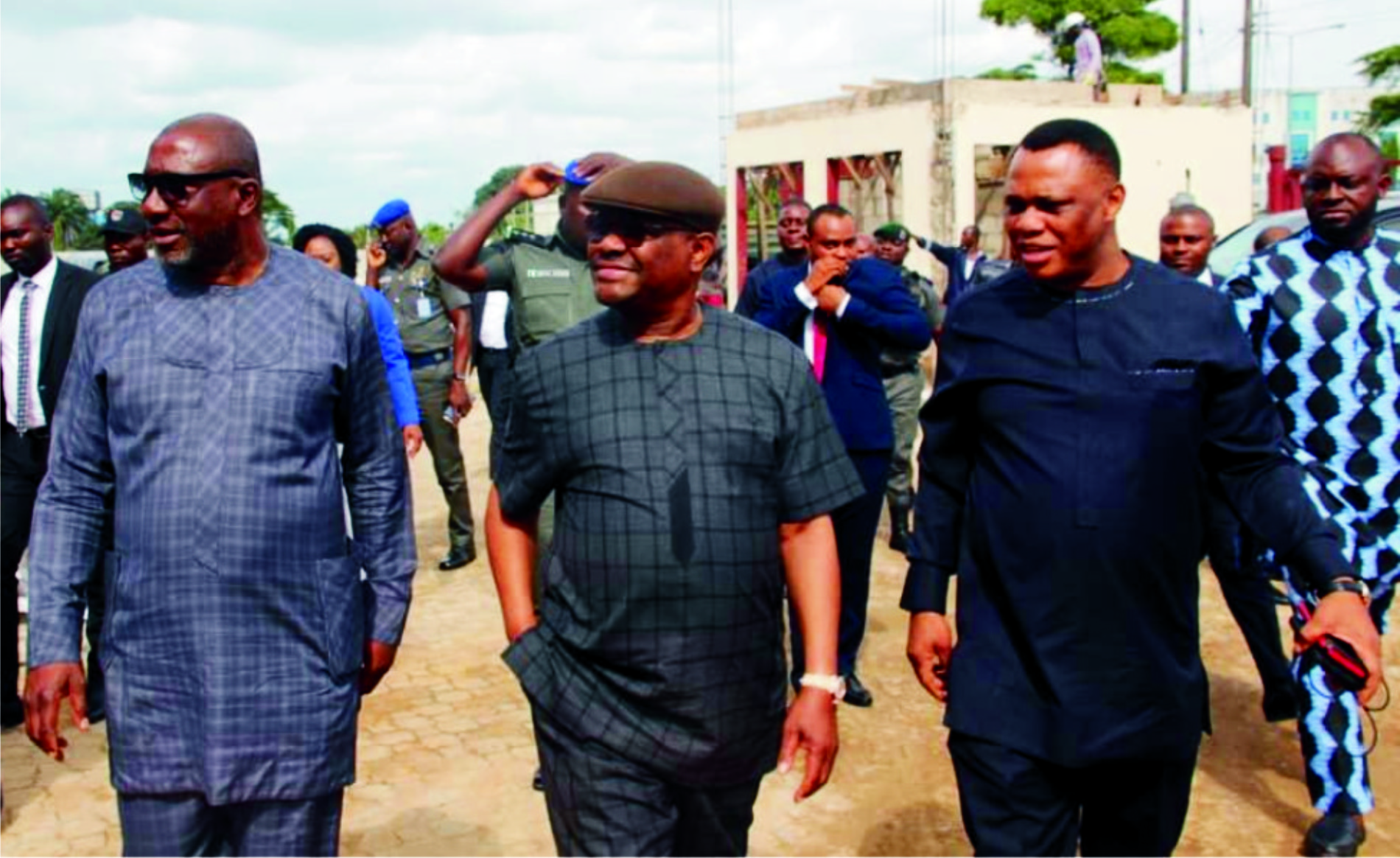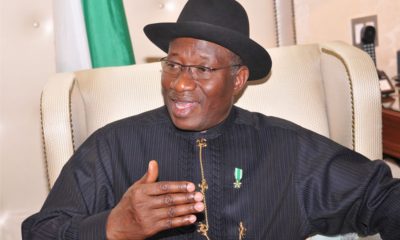Featured
Recover Govt Property From Illegal Occupants, Wike Charges Task Force …Explains Focus On Massive Urban Renewal

The Rivers State Governor, Chief Nyesom Wike has inaugurated the state Task Force for the Recovery of Government Properties, with a charge to members of the task force to work diligently for the state.
Inaugurating the committee in Government House, Port Harcourt, last Monday, Wike said several permanent secretaries and top civil servants have retired from service, but were still illegally occupying government quarters.
Wike noted that several attempts to ensure that they vacate government quarters, so that serving officers can reside in such houses have met with resistance from the retired senior civil servants.
“You are by this inauguration required to recover all government properties illegally occupied by some persons.
“There are many civil servants who have retired from service, but are still occupying government buildings several years after retirement. This has made it difficult for those in service to have official quarters allocated to them”, he said.
The governor told members of the task force that they would face challenges while carrying out their responsibilities, and advised them to be firm.
He assured that the Rivers State Government would provide the required security and logistical support for them to carry out their functions.
Wike said that some top civil servants have gone as far as taking illegal measures to own government properties, noting that in some blocks of flats, some have gone to illegally acquire Certificates of Occupancy (CoOs).
“If you are a civil servant, you already know when you are to retire. Therefore, you have to plan for retirement.
“It is regrettable that some civil servants even fail to maintain government buildings where they reside. Do this assignment diligently. Except there is a clear court order, recover government buildings that have been illegally occupied”, he directed members of the task force.
The governor also charged the task force to locate government lands that have been illegally occupied and recover same.
Responding, Chairman of the Task Force for the Recovery of Government Properties, Barrister Rufus Godwins appreciated the governor for the confidence reposed in the members to carry out the important responsibility.
Godwins, who is also the Head of Service, assured the Rivers State governor that the task force would locate, identify and recover all government properties illegally occupied.
He said where the task force meets resistance; it would recommend prosecution of the affected persons to the office of the Attorney General of Rivers State.
Meanwhile, the Rivers State Governor, Chief Nyesom Wike has explained that the ongoing urban renewal of Port Harcourt City and adjoining towns of the state capital was aimed at returning the city to its Garden City status.
Speaking after inspecting ongoing projects, last Monday, Wike said that his administration was committed to reconstructing key roads in the state capital to ease traffic congestion and boost the economy.
He said because his administration was committed to constructing roads that would last, adding that 70 per cent of the urban renewal scheme would be handled by a Nigerian-based international construction company.
“We are working hard to return Port Harcourt City to its Garden City status. That is why we have embarked on massive urban renewal across the state capital.
“Seventy per cent of the roads under construction will be handled by international construction company, Julius Berger. We are committed to delivering roads that will last for the people of the state”, he said.
On one of the roads under construction near the Polo Club, Port Harcourt, Wike said that he would invite the management of Polo Club to work towards removing the shanties that deface the area.
He said if the management of Polo Club fails to act, the state government would be compelled to take tough action.
“We cannot allow the kind of shanties that I am seeing here. I have sent for the President of Port Harcourt Polo Club to come and give them notice to quit”, he said.
The governor said that the Judges’ Quarters have already been completed, while contractors were concluding work on the external services, especially the drainage system.
He said that the Mother and Child Hospital would be completed by the end of the year, and commended the quality of work done by the contractors.
Wike was accompanied on the project inspection by the Rivers State Chairman of PDP, Bro Felix Obuah and Senator Olaka Nwogu.
Featured
Fubara Dissolves Rivers Executive Council

Rivers State Governor, Sir Siminialayi Fubara, has dissolved the State Executive Council.
The governor announced the cabinet dissolution yesterday in a statement titled ‘Government Special Announcement’, signed by his new Chief Press Secretary, Onwuka Nzeshi.
Governor Fubara directed all Commissioners and Special Advisers to hand over to the Permanent Secretaries or the most Senior officers in their Ministries with immediate effect.
He thanked the outgoing members of the State Executive Council for their service and wished them the best in their future endeavours.
The three-paragraph special announcement read, “His Excellency, Sir Siminalayi Fubara, GSSRS, Governor of Rivers State, has dissolved the State Executive Council.
“His Excellency, the Governor, has therefore directed all Commissioners and Special Advisers to hand over to the Permanent Secretaries or the most Senior officers in their Ministries with immediate effect.
“His Excellency further expresses his deepest appreciation to the outgoing members of the Executive Council wishing them the best in their future endeavours.”
Featured
INEC Proposes N873.78bn For 2027 Elections, N171bn For 2026 Operations

The Independent National Electoral Commission (INEC) yesterday told the National Assembly that it requires N873.78bn to conduct the 2027 general elections, even as it seeks N171bn to fund its operations in the 2026 fiscal year.
INEC Chairman, Prof Joash Amupitan, made the disclosure while presenting the commission’s 2026 budget proposal and the projected cost for the 2027 general elections before the National Assembly Joint Committee on Electoral Matters in Abuja.
According to Amupitan, the N873.78bn election budget covers the full conduct of national polls in 2027.
An additional N171bn is needed to support INEC’s routine activities in 2026, including bye-elections and off-season elections, the commission stated.
The INEC boss said the proposed election budget does not include a fresh request from the National Youth Service Corps seeking increased allowances for corps members engaged as ad-hoc staff during elections.
He explained that, although the details of specific line items were not exhaustively presented, the almost N1tn election budget is structured across five major components.
“N379.75bn is for operational costs, N92.32bn for administrative costs, N209.21bn for technological costs, N154.91bn for election capital costs and N42.61bn for miscellaneous expenses,” Amupitan said.
The INEC chief noted that the budget was prepared “in line with Section 3(3) of the Electoral Act 2022, which mandates the Commission to prepare its election budget at least one year before the general election.”
On the 2026 fiscal year, Amupitan disclosed that the Ministry of Finance provided an envelope of N140bn, stressing, however, that “INEC is proposing a total expenditure of N171bn.”
The breakdown includes N109bn for personnel costs, N18.7bn for overheads, N42.63bn for election-related activities and N1.4bn for capital expenditure.
He argued that the envelope budgeting system is not suitable for the Commission’s operations, noting that INEC’s activities often require urgent and flexible funding.
Amupitan also identified the lack of a dedicated communications network as a major operational challenge, adding that if the commission develops its own network infrastructure, Nigerians would be in a better position to hold it accountable for any technical glitches.
Speaking at the session, Senator Adams Oshiomhole (APC, Edo North) said external agencies should not dictate the budgeting framework for INEC, given the unique and sensitive nature of its mandate.
He advocated that the envelope budgeting model should be set aside.
He urged the National Assembly to work with INEC’s financial proposal to avoid future instances of possible underfunding.
In the same vein, a member of the House of Representatives from Edo State, Billy Osawaru, called for INEC’s budget to be placed on first-line charge as provided in the Constitution, with funds released in full and on time to enable the Commission to plan early enough for the 2027 general election.
The Joint Committee approved a motion recommending the one-time release of the Commission’s annual budget.
The committee also said it would consider the NYSC’s request for about N32bn to increase allowances for corps members to N125,000 each when engaged for election duties.
The Chairman of the Senate Committee on INEC, Senator Simon Along, assured that the National Assembly would work closely with the Commission to ensure it receives the necessary support for the successful conduct of the 2027 general elections.
Similarly, the Chairman of the House Committee on Electoral Matters, Bayo Balogun, also pledged legislative support, warning INEC to be careful about promises it might be unable to keep.
He recalled that during the 2023 general election, INEC made strong assurances about uploading results to the INEC Result Viewing portal, creating the impression that results could be monitored in real time.
“iREV was not even in the Electoral Act; it was only in INEC regulations. So, be careful how you make promises,” Balogun warned.
The N873.78bn proposed by INEC for next year’s general election is a significant increase from the N313.4bn released to the Commission by the Federal Government for the conduct of the 2023 general election.
Featured
Tinubu Mourns Literary Icon, Biodun Jeyifo

President Bola Tinubu yesterday expressed grief over the death of a former President of the Academic Staff Union of Universities and one of Africa’s foremost literary scholars, Professor Emeritus Biodun Jeyifo.
Jeyifo passed away on Wednesday, drawing tributes from across Nigeria and the global academic community.
In a condolence message to the family, friends, and associates of the late scholar, Tinubu in a statement by his spokesperson, Bayo Onanuga, described Jeyifo as a towering intellectual whose contributions to African literature, postcolonial studies, and cultural theory left an enduring legacy.
He noted that the late professor would be sorely missed for his incisive criticism and masterful interpretations of the works of Nobel laureate, Professor Wole Soyinka.
The President also recalled Jeyifo’s leadership of ASUU, praising the temperance, foresight, and wisdom he brought to the union over the years.
Tinubu said Jeyifo played a key role in shaping negotiation frameworks with the government aimed at improving working conditions for university staff and enhancing the learning environment in Nigerian universities.
According to the President, Professor Jeyifo’s longstanding advocacy for academic freedom and social justice will continue to inspire generations.
He added that the late scholar’s influence extended beyond academia into political and cultural journalism, where he served as a mentor to numerous scholars, writers, and activists.
Tinubu condoled with ASUU, the Nigerian Academy of Letters, the Wole Soyinka Centre for Investigative Journalism, the University of Ibadan, Obafemi Awolowo University, Oberlin University, Cornell University, and Harvard University—institutions where Jeyifo studied, taught, or made significant scholarly contributions.
“Nigeria and the global academic community have lost a towering figure and outstanding global citizen,” the President said.
“Professor Biodun Jeyifo was an intellectual giant who dedicated his entire life to knowledge production and the promotion of human dignity. I share a strong personal relationship with him. His contributions to literary and cultural advancement and to society at large will be missed.”
Jeyifo was widely regarded as one of Africa’s most influential literary critics and public intellectuals. Among several honours, he received the prestigious W.E.B. Du Bois Medal in 2019.
-

 Politics1 day ago
Politics1 day agoAPC Releases Adjusted Timetable For Nationwide Congresses, Convention
-

 Sports5 days ago
Sports5 days agoU-20 WWC: Falconets claim qualifier win
-

 Sports5 days ago
Sports5 days agoArsenal Women End Man City’s Invincibility
-

 Sports5 days ago
Sports5 days agoInsurance Deepen Enyimba’s Trouble
-

 Sports5 days ago
Sports5 days agoYouth Olympics preparation Gears up
-

 Sports5 days ago
Sports5 days agoCologne Youth Team Set Crowd Record
-

 Sports5 days ago
Sports5 days agoTornadoes Set For NPFL exit over Stadium Ban
-

 Sports5 days ago
Sports5 days agoBarca Pull Out Of Super League Project











